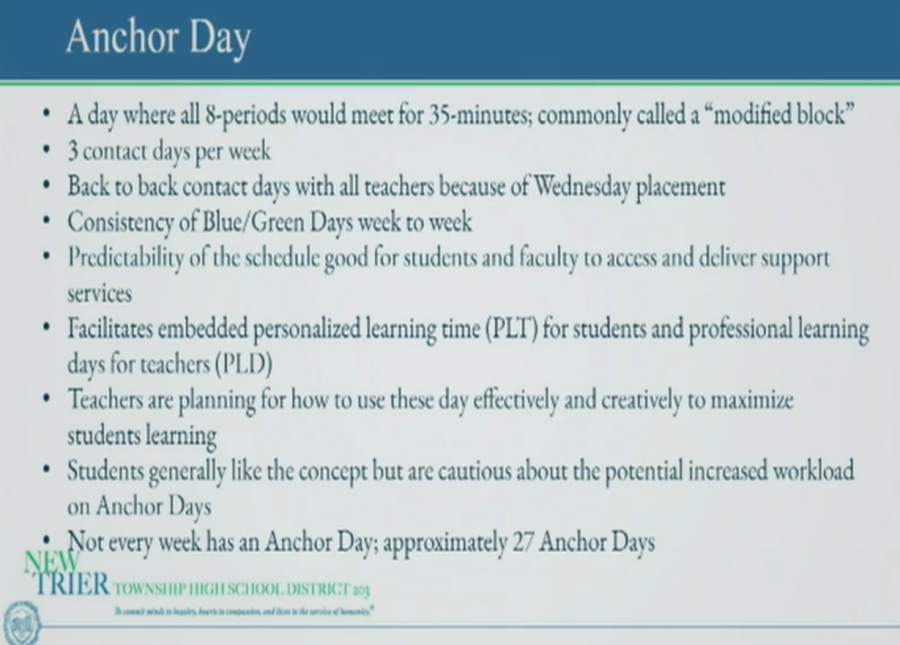Board of Education releases schedule changes for next year
“Anchor Days” will be implemented for the 2022-2023 school year, marking the third major schedule change in the past three years
School Board lays out Anchor Day plans in their Feb. 22 meeting
Following feedback from students, staff, and families, the school decided to introduce a schedule where students each class on Wednesday for 35 minutes. The feedback included surveys, where students and staff were almost identical with 42% approval of the length of the 85-minute block,
Assistant Superintendent Peter Tragos has been at the heart of this change since presenting the idea in the Feb 22 board meeting, which will lower learning time on Wednesdays by 12.5%.
“The big takeaway of the survey in December was a question about whether the current block schedule could be improved with modification, and teachers at an 89% rate agreed,” said Tragos. “Students responded to that question at 83%.”
Feedback from multiple sources revealed that students enjoyed the block scheduling because, with the four-period day, homework was far more manageable. While there is no concrete system in place to prevent homework from increasing on these eight-period Wednesdays, discussions have begun to work out this potential issue.
“Teachers even know that this could be a time where homework and tests get funneled into that Anchor Day,” says Tragos. “So we’re working right now to make sure we don’t upset the balance of what’s working well regarding homework that can be spread across two days.”
Anchor Days were made to fix Blue and Green Days into more predictable days during the week, along with creating a schedule based on student support and professional development for staff. This makes yet another schedule change in the past two years, which has included block scheduling, hybrid learning, and Gray Days.
“It was just out of necessity we had shifted from a nine-period day during COVID in March 2020, as we quickly learned zooming nine periods didn’t work well,” says Tragos. “That’s not to say we didn’t talk about blocks before, but we didn’t have the catalyst to drive that change.”
On these Anchor Days, one department will have an entire day based on professional development. This includes focus on how class time can be spent more effectively, often led by one staff member passing down their ideas to others. Student’s will likewise use their additional personalized learning time to catch up on work while teachers improve their practice.
Professional development has always been important, especially when teachers need to adapt to changing schedules.
“I would call it a sharing of practices,” says Tragos, “It will look very familiar to the classroom. You might see somebody leading a session and sharing ideas, and then others participating in that.”
Senior Mady Erb’suciu has gone through all the recent schedules at New Trier and has found they get easier to adapt to each year. She sees the pros and cons of the changes but has enjoyed the extra student support time and the overall block schedule.
“I’ve been able to get a lot of homework done with the support periods, so that sounds good about Gray Days,” said Erb’suciu. “I like the scheduling now more than when it first started.”
Survey feedback was only a minor aspect in driving this change. Student support groups, specifically student council and a cross section of other student groups like affinity groups, SALT, and ALPS, have offered their opinion on different aspects of Anchor Days.
“You get asked very specific questions and students could give feedback,” says Tragos. “It was a conversation as opposed to a survey.”
Teacher feedback tended to be similar to that of students, however for different reasons. Where students are generally more worried about managing homework throughout the week, teachers focus on how their lessons mold into 35 or 85 minute periods. This includes French teacher Fanka Dimitrov, who sees both sides to the argument.
“I like the Anchor Day because it gives us that one more day a week that we see our students and speak the language,” says Dimitrov. “On the other hand, a full block gives you the opportunity to develop a lesson from beginning to end and get to more productive, creative activities than in a shorter period.”
This new information comes from the Board of Education in their most recent board meeting. Student, parent, and staff feedback remains critical in all the decisions made by this board, as they hope to satisfy the many voices with another schedule alteration.
“This experiment with the block schedule gave us some kind of real lived experience in the block schedule to start seeing its benefits,” says Tragos. “That’s one of the reasons we were able to continue with it while continuing to improve it.”






































